- Home
- Cynthia Kadohata
The Thing About Luck
The Thing About Luck Read online
ATHENEUM BOOKS FOR YOUNG READERS
An imprint of Simon & Schuster Children’s Publishing Division
1230 Avenue of the Americas, New York, New York 10020
www.SimonandSchuster.com
This book is a work of fiction. Any references to historical events, real people, or real places are used fictitiously. Other names, characters, places, and events are products of the author’s imagination, and any resemblance to actual events or places or persons, living or dead, is entirely coincidental.
Text copyright © 2013 by Cynthia Kadohata
Illustrations copyright © 2013 by Julia Kuo
All rights reserved, including the right of reproduction in whole or in part in any form.
ATHENEUM BOOKS FOR YOUNG READERS is a registered trademark of Simon & Schuster, Inc.
Atheneum logo is a trademark of Simon & Schuster, Inc.
The Simon & Schuster Speakers Bureau can bring authors to your live event. For more information or to book an event, contact the Simon & Schuster Speakers Bureau at 1-866-248-3049 or visit our website at www.simonspeakers.com.
Book design by Mike Rosamilia
Jacket design by Russell Gordon
Jacket illustration and hand-lettering by Julia Kuo
The text for this book is set in Berkeley Oldstyle Book.
First Edition
Library of Congress Cataloging-in-Publication Data
Kadohata, Cynthia.
The thing about luck / Cynthia Kadohata ; illustrated by Julia Kuo. — 1st ed.
p. cm.
Summary: Just when twelve-year-old Summer thinks nothing else can possibly go wrong in a year of bad luck, an emergency takes her parents to Japan, leaving Summer to care for her little brother while helping her grandmother cook for harvest workers.
ISBN 978-1-4169-1882-0
ISBN 978-1-4424-7467-3 (eBook)
[1. Farm life—Kansas—Fiction. 2. Grandparents—Fiction. 3. Brothers and sisters—Fiction. 4. Japanese Americans—Fiction. 5. Luck—Fiction. 6. Kansas—Fiction.] I. Kuo, Julia, ill. II. Title.
PZ7.K1166Thi 2013
[Fic]—dc23 2012021287
FOR SAMMY, ALWAYS AND FOREVER
CONTENTS
Chapter One
Chapter Two
Chapter Three
Chapter Four
Chapter Five
Chapter Six
Chapter Seven
Chapter Eight
Chapter Nine
Chapter Ten
Chapter Eleven
Chapter Twelve
Chapter Thirteen
Chapter Fourteen
Chapter Fifteen
Chapter Sixteen
Acknowledgments
About Cynthia Kadohata
CHAPTER ONE
Kouun is “good luck” in Japanese, and one year my family had none of it. We were cursed with bad luck. Bad luck chased us around, pointing her bony finger. We got seven flat tires in six weeks. I got malaria, one of fifteen hundred cases in the United States that year. And my grandmother’s spine started causing her excruciating pain.
Furthermore, random bad smells emanated from we knew not where. And my brother, Jaz, became cursed with invisibility. Nobody noticed him except us. His best friend had moved away, and he did not know a single boy to hang around with. Even our cousins looked the other way when they saw him at our annual Christmas party. They didn’t even seem to be snubbing my brother; they just didn’t see him.
The thing about luck is that it’s like a fever. You can take fever meds and lie in bed and drink chicken broth and sleep seventeen hours in a row, but basically your fever will break when it wants to break.
In early April my parents got a call from Japan. Three elderly relatives were getting ready to die and wanted my parents to take care of them in their last weeks and months. There was nothing surprising about this. This was just the way our year was going. It was April 25 when my grandparents and Jaz delivered my parents to the airport to catch their plane to Japan. I stayed at home because the type of malaria I’d gotten was called “airport malaria.” Airport malaria is when a rogue mosquito from, say, Africa has been inadvertently carried into the United States on a jet. This infected mosquito might bite you. I got bit in Florida last summer, and I lived in Kansas. The chances that I would get malaria from going to the airport in Kansas were remote, but I’d grown so scared of mosquitoes that sometimes I didn’t even like stepping outside. It really wasn’t fair—I was only twelve, and yet already I was scared of the entire outside world.
During the 1940s there were thousands of malaria cases in the United States. Then in the fifties the experts thought malaria here was eradicated. But every so often, someone still caught it. Sometimes you would get your picture in the newspaper. My picture was even in Time magazine!
Obaachan and Jiichan, my grandmother and grandfather on my mother’s side, were both sixty-seven and lived with us in Littlefield, Kansas. “Obaachan” was more formal than “Baachan,” but it was what she wanted Jaz and me to call her.
When harvest season arrived in May of our horrible year, Jiichan planned to come out of retirement to work as a combine driver for a custom harvesting company called Parker Harvesting, Inc. (I’ll explain about custom harvesting in a minute or two.) My grandmother would work as a cook for the same harvester, with me as her helper.
We’d all worked for the Parkers before. But it was the first time my parents wouldn’t be there, which meant only my grandparents would be paying the mortgage during harvest this year. I didn’t quite understand what “paying the mortgage” meant, but apparently, it was a constant struggle. Another phrase that came up a lot was “paying down the principal,” as in, “If we could just pay down the principal, I’d feel like we were getting somewhere.” I used to think that “paying down the principal” meant they wanted to bribe the principal at one of my future schools, like they would give this principal some money, and then someday the principal would let me into high school despite my iffy grades.
Anyway. As soon as my grandparents got home from dropping off my parents, changes were implemented. My mother had told Jaz, “Don’t worry. You’ll make a friend when you least expect it.” My grandparents were more proactive. It seems Obaachan and Jiichan had a bright idea they’d been hiding from us.
Obaachan made Jaz and me sit on the floor in front of the coffee table while she and Jiichan sat on the couch. “We having meeting-party,” she announced regally. “We invite boys we will consider for friendship with Jaz.” She turned to me. “Make list with him. I no interfere.”
“A list of people to invite?” I asked. My Doberman, Thunder, tried to push himself between me and the table. I pushed back, and we just sat there, leaning hard into each other.
“No! A list!” she snapped at me.
Wasn’t that what I had just said? I finally got up and moved to a different side of the table. Still unsure what she wanted, I got a pen and paper.
“Pencil! You may need to erase.”
I got a pencil and readied myself. “Should I number the list?” I asked.
My grandfather nodded sagely. “Agenda,” he said. “List for boys we invite, agenda for party.”
“No interfere!” Obaachan said to Jiichan.
“You interfere first!”
“No!”
Obaachan and Jiichan had been married for forty-nine years, and my mother always said that after that number of years, you no longer had to be polite all the time. It sometimes seemed that in our house, I was the only one who had to use my manners. Jaz didn’t have to because he had issues. When I’m sixty-seven, in fifty-five years, I supposed that I would finally be able to dispense with my manners.
I thought Jiichan and O
baachan talked to each other the way that they did because they’d had an arranged marriage. Obaachan said that if I had an arranged marriage, I would never give or receive a broken heart. If I grew up beautiful, I would never break any man’s heart, and if I grew up plain, nobody would break my heart. If I rebelled and wanted love, however, all bets were off. Broken hearts would come my way like locusts.
“Summer! You in rah-rah land.” She never said “la-la land,” and I never corrected her.
I hurriedly wrote Number one on the paper in the left-hand margin.
“No number,” Obaachan said. “Arrange by time. I have to tell you everything?”
Jiichan picked up the paper, studied the Number one, and set the paper back down. “I agree. Arrange by time.”
I erased the Number one and wrote in One o’clock p.m. I made sure not to flick the eraser bits onto the floor, because if I did, Obaachan would be so upset that she might fall over dead.
“Noon!” barked Obaachan. I made the change. “Continue. First write day on top of paper in big letter. Day for meeting is next Saturday. Then continue.”
“What would you like to do at noon?” I asked Jaz.
“Play with LEGOs. I want a LEGO party.”
“Not really party,” Jiichan said. He was cleaning his teeth with the floss he always carried in his shirt pocket. Sometimes he flossed during dinner, right at the table. See what I mean about manners? Can you imagine what your parents would do if you started to floss at the dinner table? But he constantly seemed to have something between his teeth. “More of meeting than party,” he said.
“Noon lunchtime,” Obaachan said. “You feed boys first. Boys always hungry. Never mind. I no interfere. But no food, no friend. What I just say?”
“No food, no friend,” Jaz and I repeated. Obaachan sometimes made us repeat something she had just said, to prove we were listening.
Jaz turned to Obaachan. “Obaachan, will you make sandwiches?”
“Summer make. I her mentor.”
I found myself already starting to feel stressed. What if I made ham sandwiches and the boys wanted tuna fish? What if I used regular bread and one of the boys needed gluten-free, like my friend Alyssa had to eat because of her allergies? What if I used too much mayonnaise? Arghhh!
Still, next to Noon I wrote Sandwich eating.
Jiichan pounded on the paper. “Lunch!” he cried out passionately. “Not ‘sandwich eating’! It called ‘lunch’!” He clutched at his heart. “You kids go to kill me.” Apparently, about once every couple of weeks, he thought we were going to kill him.
“What kind of sandwiches would you like?” I asked Jaz, still worrying about those. “I don’t want to make the wrong kind.”
“I’ll ask around at school. I can’t believe this is happening. I’m really going to have a meeting-party.” He got up to look at himself in a mirror over our fake fireplace and said, “You are going to have a meeting-party.”
Jiichan was now standing and staggering away from us with his hands on his heart. Jaz and I watched him calmly. “I die, scatter ashes,” Jiichan said. “No keep in hole in wall at cemetery. You hear me?”
“Yes, Jiichan,” we said.
“Good. Then I die happy.”
I wrote down LEGOs, one o’clock. My brother had approximately one thousand dollars’ worth of LEGOs. Seriously. I counted once. LEGOs were one of our biggest expenses and the only thing we splurged on.
“Good plan!” Jiichan said. “That brilliant!” I couldn’t tell if he was being sarcastic as he peered over my shoulder from his death throes.
“How long is the meeting-party?” Jaz asked.
“I think most parties are two hours,” I answered. “So I guess that’s the end of the agenda?” Nobody answered, so I made a line underneath the agenda and laid down the pencil.
“Who should I invite?” Jaz asked. “Should it be just kids who I think might come, or should it be kids who might not come but on the other hand you never know? Should it be just kids in my class, or should it be all the kids in my grade? Should it be boys and girls or just boys? Should it be only kids who might not even know who I am even though I know who they are? Should it—”
Jiichan held up his palm to quiet Jaz. “Invite whole fifth grade,” he said wisely. We all looked at him, and he nodded. “That way hurt nobody’s feelings.”
Jaz stared at him doubtfully for a moment, but then his face turned from doubtful to ecstatic. I could almost hear him thinking, Wow, the whole school might come to my meeting-party!
Then my grandparents wanted Jaz to draw invitations. He was a good artist in kind of a weird way. Like, he never drew pictures of anything recognizable, but if you needed a totally psychedelic design, he was your man. But he wanted to buy invitations because he thought they were more official. We ended up driving thirty miles to a 99-cent store in a larger town. After loud and passionate debate, we bought several boxes of dinosaur invitations. On Monday, Jaz distributed them to all the kids in the fifth grade at his school.
So as not to jinx the party, we weren’t supposed to talk to one another about it. But we could pray all we wanted, in front of several sprigs of silk cherry blossoms on the coffee table. We did this the night before the party. Cherry blossoms, as the harbingers of spring, were important to Japanese farmers. My grandmother mumbled in Japanese as I knelt beside her. I could make out a word occasionally—like unmei for “destiny.”
As Obaachan muttered on, I prayed in my head: Please let my brother have a successful meeting-party. Let the kids have fun, let him make at least one friend, preferably two. Please, please, please.
That night I drew in my notebook like I always did. I didn’t draw very well, so each picture took me weeks. I copied them from photographs of mosquitoes I found.
One time I thought I had a perfect drawing, so I sent it to a mosquito expert, and this is what he said: “Looks like an Anopheles, but the proboscis is ‘hairy’ and the palps look like a thin line, so this is not a good representation, but could easily be changed (make palps more than a line and get rid of bristle on mouthparts and you have an Anopheles female). The problem is that most (but not all) Anopheles in the U.S. tend to have spots on their wings, which these drawings lack.” Wow, epic fail on my part!
It was strange because I knew that if I had almost been killed by a car, I wouldn’t have become fascinated with cars. If I had almost drowned, I wouldn’t have become obsessed with water. But the more I looked at mosquitoes, even the same type that had infected me, the more delicate they seemed. Fragile, even. And yet one had almost taken my life. It was like now we couldn’t be separated. I mean, if I saw one on my arm, I wouldn’t hesitate to smash it or even run screaming down the highway. They terrified me. But still, we were inseparable.
CHAPTER TWO
Three boys from Jaz’s class had said they could come to the party. Nobody else had RSVP’d. But it didn’t matter. Three boys! We were so, so excited. At eleven on Saturday morning my friend Melody came over in case we needed help.
“What should I do?” Mel asked Obaachan.
“Vacuum living room.”
“Obaachan,” I said, “she’s a guest.”
“She here to work.”
I shook my head at Mel to let her know she didn’t have to vacuum. But we couldn’t have a for-real conversation with Obaachan and Jiichan listening. So we just talked about the coming harvest.
Let me finally explain about custom harvesters. Many wheat farmers don’t cut their own wheat. They bring in custom harvesters like the Parkers, who hire independent contractors like my family to drive the giant combines that cut the wheat. They also hire drivers of big rigs to haul the wheat to grain elevators. Grain elevators are usually tall reinforced-concrete buildings that you may have seen but never really thought about. The elevators are where the grain is stored.
The custom harvesters are the ones who own or lease the really, really expensive equipment. They’re usually family-owned companies. A new combine
can cost $350,000, so you need to have really good credit to get a loan from the bank to buy or lease your equipment. Shoot, our house cost a quarter of that. During the harvest season these companies travel from farm to farm, from Texas to Montana or North Dakota, and even up to Canada for some harvesters.
Anyway, enough about custom harvesters (for now). I made two chicken-breast sandwiches, and Mel made two. Every so often, I slipped Thunder a piece of chicken, so he sat his best sit as I cut the sandwiches in half and inserted toothpicks topped with colored cellophane into each half. Then I put a sprig of parsley on each plate, which is kind of fancy, but I wanted to make a good impression.
Melody, Obaachan, Jiichan, and I sat at the kitchen table waiting while Jaz sat in the living room. “Summer, get your hair under control,” Obaachan said. “You look like Yoko Ono, 1969.” I had the bad luck of being in that small minority of Asian people with frizzy hair. Usually I wore it in braids, but I hadn’t done that today.
I braided my hair in the bathroom. Melody came with me. “I have a bad feeling about this whole party thing,” I said.
“What do you mean?” Mel asked.
“I don’t know. At least we’re going on harvest pretty soon. Kids are less snotty on harvest. They’re desperate for someone to play with. Me, I’m mostly worried that everyone at school will forget me.”
“I won’t forget you if you promise you won’t forget me,” Mel said.
“Deal,” I said.
“Deal,” she responded.
So at least I would have one friend to come back to. We hadn’t gone on harvest the previous year because my parents had found local work, so this would be my first harvest since I got sick. Lately, I’d been lying in bed at night, thinking on the one hand, about all the mosquitoes I would see on harvest, and on the other hand, what it would do to my health to be smearing on the insecticide DEET every night for several months. Supposedly, DEET was known for not being bad for humans, but whenever I first put it on, Thunder didn’t like to be near me.

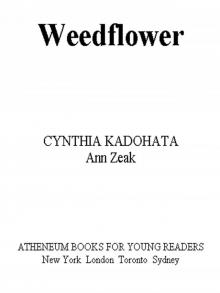 Weedflower
Weedflower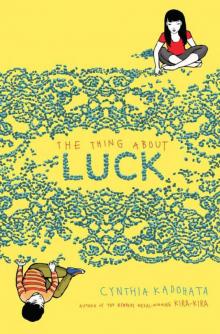 The Thing About Luck
The Thing About Luck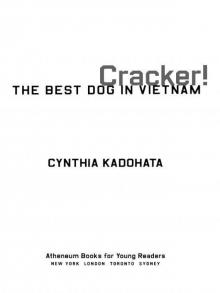 Cracker!: The Best Dog in Vietnam
Cracker!: The Best Dog in Vietnam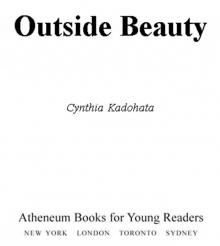 Outside Beauty
Outside Beauty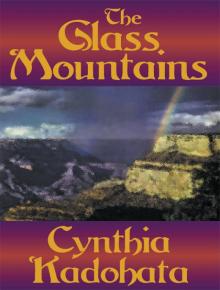 The Glass Mountains
The Glass Mountains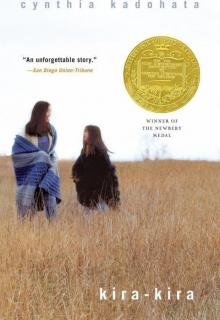 Kira-Kira
Kira-Kira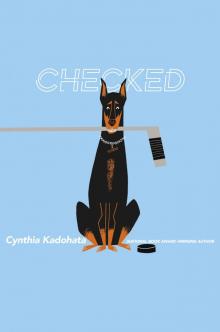 Checked
Checked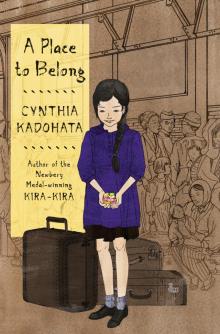 A Place to Belong
A Place to Belong A Million Shades of Gray
A Million Shades of Gray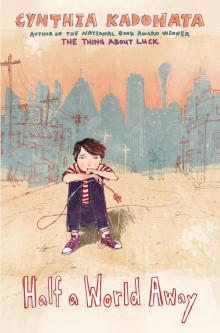 Half a World Away
Half a World Away